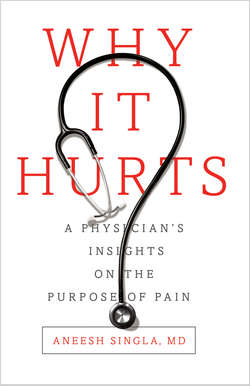Читать книгу Why It Hurts - Dr. Aneesh Singla - Страница 12
На сайте Литреса книга снята с продажи.
The Human Response to Pain
ОглавлениеHumans remember painful things like nothing else. From hazing rituals and other rites of passage, to childbirth and injuries or illnesses, events involving intense pain are etched into our memories. Depending on the story we tell ourselves about our suffering, they are often remembered as transformative events, experiences that turned us into who we have become.
As I sat in the emergency room waiting for someone to stitch up my leg, I wondered what I could have done differently: pick up the bottles one by one? Take my time instead of rushing? Wear pants instead of shorts? A dozen thoughts went through my mind. It’s human nature to imagine alternatives when an accident occurs. We seek the lesson in the pain when it isn’t obvious.
Some patients are shocked when I tell them there is an upside to pain, but this mindset is crucial to our survival. The downside of having no pain is far worse, as we will see in Chapter 2. In Kelly McGonigal’s book The Upside of Stress, she makes a similar argument about stress. Using stress as a positive or adaptive force that pushes you to overcome the challenge ahead is far healthier in the long run than trying to avoid stress. We feel stress because what we’re doing matters to us.
There is something similar to be said about pain. In fact, stress can exacerbate pain and vice versa, but with the right mindset you can use these feelings as a catalyst to energize yourself, when you turn your thoughts towards the task at hand.
The concept of learning from our mistakes is in many ways about learning from our pain. Mistakes are painful—physically as well as psychologically—but we learn from them and use them to better ourselves. Along this journey of trying to better understand pain, I have come to believe that pain is a rich and vital source of learning.
***
Eventually, I was brought to an exam room and asked to sit on a gurney. The familiar sterile environment was accompanied by the smell of alcohol and polished steel. Everything about it said hospital. The physician’s assistant greeted me in a no-nonsense manner.
“I’m going to numb you up, wash out the wound, and sew you up,” she said. “Okay?” I lay down on my side. As she worked, I prided myself for not complaining about the pain or showing any outward signs of discomfort. It struck me as funny how strongly conditioned we are not to show pain in modern society, despite the fact that this desire to cry out is adaptive, intended to let others know we need help.
“When was your last tetanus shot?”
“I can’t remember.” I said, embarrassed. So she gave me another one, just in case. Ouch.
